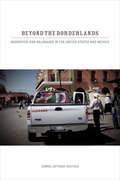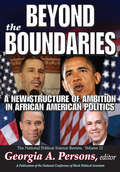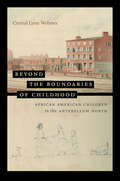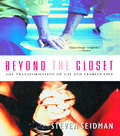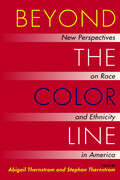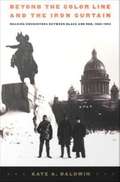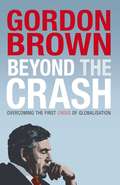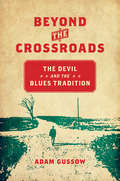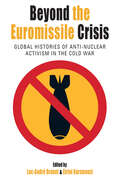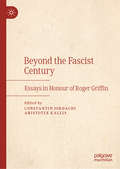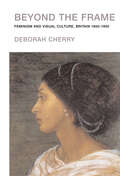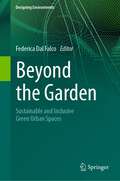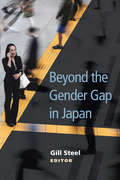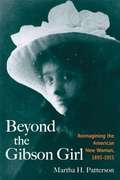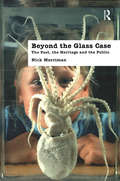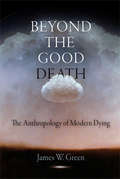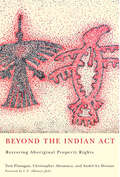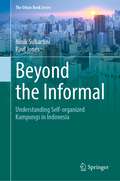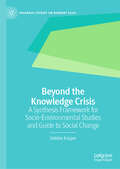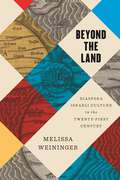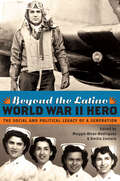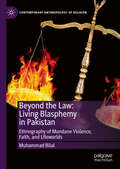- Table View
- List View
Beyond the Borderlands
by Debra Lattanzi ShutikaOver the last three decades, migration from Mexico to the United States has moved beyond the borderlands to diverse communities across the country, with the most striking transformations in American suburbs and small towns. This study explores the challenges encountered by Mexican families as they endeavor to find their place in the U.S. by focusing on Kennett Square, a small farming village in Pennsylvania known as the "Mushroom Capital of the World." In a highly readable account based on extensive fieldwork among Mexican migrants and their American neighbors, Debra Lattanzi Shutika explores the issues of belonging and displacement that are central concerns for residents in communities that have become new destinations for Mexican settlement. Beyond the Borderlands also completes the circle of migration by following migrant families as they return to their hometown in Mexico, providing an illuminating perspective of the tenuous lives of Mexicans residing in, but not fully part of, two worlds.
Beyond the Boundaries: A New Structure of Ambition in African American Politics (National Political Science Review Series)
by Georgia A. PersonsIn the past, African American aspirations for political offi ce were assumed to be limited to areas with sizeable black population bases. By and large, black candidates have rarely been successful in statewide or national elections. This has been attributed to several factors: limited resources available to African American candidates, or identifi cation with a black liberationist ideological thrust. Other factors have been a relatively small and spatially concentrated primary support base of black voters, and the persistent resistance of many white voters to support black candidates.For these reasons, the possibility of black candidates winning elections to national offi ce was presumably just a dream. Conventional wisdom conceded a virtual cap on both the possible number of black elected officials and the level of elective offi ce to which they could ascend. But objective political analysis has not always made sufficient allowances for the more universal phenomenon of individual political ambitions. Th e contributors to this volume explore the ways ambitious individuals identifi ed and seized upon strategies that are expanding the boundaries of African American electoral politics.This volume is anchored by a symposium that focuses on new possibiities in African American politics. Both the electoral contests of 2006 and the Barack Obama presidential campaign represent an emergent dynamic in American electoral politics. Analysts are beginning to agree that the contours of social change now make the electoral successes of black candidates who are perceived as ideologically and culturally mainstream increasingly likely. The debate captured in this volume will likely inspire further scholarly inquiry into the changing nature and dimensions of the larger dynamic of race in American politics and the subsequent changing political fortunes of African American candidates.
Beyond the Boundaries of Childhood: African American Children in the Antebellum North (The John Hope Franklin Series in African American History and Culture)
by Crystal Lynn WebsterFor all that is known about the depth and breadth of African American history, we still understand surprisingly little about the lives of African American children, particularly those affected by northern emancipation. But hidden in institutional records, school primers and penmanship books, biographical sketches, and unpublished documents is a rich archive that reveals the social and affective worlds of northern Black children. Drawing evidence from the urban centers of Boston, New York, and Philadelphia, Crystal Webster's innovative research yields a powerful new history of African American childhood before the Civil War. Webster argues that young African Americans were frequently left outside the nineteenth century's emerging constructions of both race and childhood. They were marginalized in the development of schooling, ignored in debates over child labor, and presumed to lack the inherent innocence ascribed to white children. But Webster shows that Black children nevertheless carved out physical and social space for play, for learning, and for their own aspirations. Reading her sources against the grain, Webster reveals a complex reality for antebellum Black children. Lacking societal status, they nevertheless found meaningful agency as historical actors, making the most of the limited freedoms and possibilities they enjoyed.
Beyond the Closet: The Transformation of Gay and Lesbian Life
by Steven SeidmanGay life has become increasingly open in the last decade. In Beyond the Closet , Steven Seidman, a well-known author and leading scholar in sexuality, is the first to chronicle this lifestyle change and to look at the lives of contemporary gays and lesbians to see how their "out" status has changed. This compelling, well-written, and smart account is an important step forward for the gay and lesbian community.
Beyond the Color Line: New Perspectives on Race and Ethnicity in America
by Abigail Thernstrom Stephan ThernstromTwenty-five essays covering a range of areas from religion and immigration to family structure and crime examine America's changing racial and ethnic scene. They clearly show that old civil rights strategies will not solve today's problems and offer a bold new civil rights agenda based on today's realities.
Beyond the Color Line and the Iron Curtain: Reading Encounters Between Black and Red, 1922-1963
by Kate A. BaldwinExamining the significant influence of the Soviet Union on the work of four major African American authors--and on twentieth-century American debates about race--Beyond the Color Line and the Iron Curtain remaps black modernism, revealing the importance of the Soviet experience in the formation of a black transnationalism. Langston Hughes, W. E. B. Du Bois, Claude McKay, and Paul Robeson each lived or traveled extensively in the Soviet Union between the 1920s and the 1960s, and each reflected on Communism and Soviet life in works that have been largely unavailable, overlooked, or understudied. Kate A. Baldwin takes up these writings, as well as considerable material from Soviet sources--including articles in Pravda and Ogonek, political cartoons, Russian translations of unpublished manuscripts now lost, and mistranslations of major texts--to consider how these writers influenced and were influenced by both Soviet and American culture. Her work demonstrates how the construction of a new Soviet citizen attracted African Americans to the Soviet Union, where they could explore a national identity putatively free of class, gender, and racial biases. While Hughes and McKay later renounced their affiliations with the Soviet Union, Baldwin shows how, in different ways, both Hughes and McKay, as well as Du Bois and Robeson, used their encounters with the U. S. S. R. and Soviet models to rethink the exclusionary practices of citizenship and national belonging in the United States, and to move toward an internationalism that was a dynamic mix of antiracism, anticolonialism, social democracy, and international socialism. Recovering what Baldwin terms the "Soviet archive of Black America," this book forces a rereading of some of the most important African American writers and of the transnational circuits of black modernism.
Beyond the Crash: Overcoming the First Crisis of Globalisation
by Gordon BrownGordon Brown's book will offer insight into the events that led to the fiscal downward spiral and the reactions of world leaders as they took steps to avoid further disaster. The book will also offer measures Brown believes the world should adopt to regain fiscal stability. Long admired for his grasp of economic issues, Brown's book will be a work of paramount interest during these uncertain financial times and is sure to attract intense media coverage. The book offers a unique perspective on the financial crisis as well as innovative ideas that will help create a sound economic future and will help readers understand what really has happened to our economy. Mr Brown has this to say: 'We now live in a world of global trade, global financial flows, global movements of people and instant global communications. Our economies are connected as never before, and I believe that global economic problems require global solutions and global institutions. In writing my analysis of the financial crisis, I wanted to help explain how we got here, but more importantly to offer some recommendations as to how the next stage of globalisation can be managed so that the economy works for people and not the other way around'
Beyond the Crossroads: The Devil and the Blues Tradition (New Directions in Southern Studies)
by Adam GussowThe devil is the most charismatic and important figure in the blues tradition. He's not just the music's namesake ("the devil's music"), but a shadowy presence who haunts an imagined Mississippi crossroads where, it is claimed, Delta bluesman Robert Johnson traded away his soul in exchange for extraordinary prowess on the guitar. Yet, as scholar and musician Adam Gussow argues, there is much more to the story of the devil and the blues than these cliched understandings.In this groundbreaking study, Gussow takes the full measure of the devil's presence. Working from original transcriptions of more than 125 recordings released during the past ninety years, Gussow explores the varied uses to which black southern blues people have put this trouble-sowing, love-wrecking, but also empowering figure. The book culminates with a bold reinterpretation of Johnson's music and a provocative investigation of the way in which the citizens of Clarksdale, Mississippi, managed to rebrand a commercial hub as "the crossroads" in 1999, claiming Johnson and the devil as their own.
Beyond the Euromissile Crisis: Global Histories of Anti-Nuclear Activism in the Cold War (Protest, Culture & Society)
by Luc-André Brunet Eirini KaramouziHistorical consensus views the Euromissile Crisis of the early 1980s as “the last battle of the Cold War.” In this illuminating re-examination of this multifaceted campaign, Beyond the Euromissile Crisis broadens our understanding of anti-nuclear activism, highlighting how it remains a truly global phenomenon. Investigating the motivations, forms of action, and accomplishments of activists from South Africa, Polynesia, Brazil and elsewhere, this volume offers new ways of conceptualizing the chronology of anti-nuclear protest.
Beyond the Fascist Century: Essays in Honour of Roger Griffin
by Constantin Iordachi Aristotle KallisThis book evaluates the current and future state of fascism studies, reflecting on the first hundred years of fascism and looking ahead to a new era in which fascism studies increasingly faces fresh questions concerning its relevance and the potential reappearance of fascism. This wide-ranging work celebrates Roger Griffin’s contributions to fascism studies – in conceptual and definitional terms, but also in advancing our understanding of fascism – which have informed related research in a number of fields and directions since the 1990s. Bringing together three ‘generations’ of fascism scholars, the book offers a combination of broad conceptual essays and contributions focusing on particular themes and facets of fascism. The book features chapters, which, although diverse in their approaches, explore Griffin’s work while also engaging critically with other schools of thought. As such, it identifies new avenues of research in fascism studies, placing Griffin’s work within the context of new and emerging voices in the field.
Beyond the Frame: Feminism and Visual Culture, Britain 1850 -1900
by Deborah CherryBeyond the Frame rewrites the history of Victorian art to explore the relationships between feminism and visual culture in a period of heady excitement and political struggle. Artists were caught up in campaigns for women's enfranchisement, education and paid work, and many were drawn into controversies about sexuality. This richly documented and compelling study considers painting, sculpture, prints, photography, embroidery and comic drawings as well as major styles such as Pre-Raphaelitism, Neo-Classicism and Orientalism. Drawing on critical theory and post-colonial studies to analyse the links between visual media, modernity and imperialism, Deborah Cherry argues that visual culture and feminism were intimately connected to the relations of power.
Beyond the Garden: Sustainable and Inclusive Green Urban Spaces (Designing Environments)
by Federica Dal FalcoThe book addresses the interdisciplinary and multiscale theme of the design of sustainable, inclusive and creative urban green spaces in relation to the socio-ecological transition and in line with the systemic vision promoted by the 2030 Agenda, the 17 Sustainable Development Goals (SDGs) and the principles outlined by the New European Bauhaus (European Commission, 2021). The publication refers to the International Study Day organized in June 2022 by the Unit for Internationalization of the PDTA Department of the Sapienza University of Rome, develops and updates its themes, with essays that deepen theories and methodologies pursued in specific disciplinary and research fields, and with case studies of design experiments and achievements that constitute best practices at an international level in the sign of a conscious sustainability. The book is therefore part of an international and interdisciplinary dialogue and discussion focused on the challenges of climate change, economic crises and social inequalities as well as the questions that emerged during the Covid-19 pandemic. These issues are fundamental in the rethinking and reconfiguration of the role of urban green spaces, conceived as a priority place for the existence of citizens, the archetype of European culture, the conservation of biodiversity, and the relationship with nature.
Beyond the Gender Gap in Japan (Michigan Monograph Series in Japanese Studies #85)
by Gill SteelWhy do Japanese women enjoy a high sense of well-being in a context of high inequality? Beyond the Gender Gap in Japan brings together researchers from across the social sciences to investigate this question. The authors analyze women’s values and the lived experiences at home, in the family, at work, in their leisure time, as volunteers, and in politics and policy-making. Their research shows that the state and firms have blurred “the public” and “the private” in postwar Japan, constraining individuals’ lives, and reveals the uneven pace of change in women’s representation in politics. Yet, despite these constraints, the increasing diversification in how people live and how they manage their lives demonstrates that some people are crafting a variety of individual solutions to structural problems. Covering a significant breadth of material, the book presents comprehensive findings that use a variety of research methods—public opinion surveys, in-depth interviews, a life history, and participant observation—and, in doing so, look beyond Japan’s perennially low rankings in gender equality indices to demonstrate the diversity underneath, questioning some of the stereotypical assumptions about women in Japan.
Beyond the Gibson Girl: Reimagining the American New Woman, 1895-1915
by Martha H. PattersonChallenging monolithic images of the New Woman as white, well-educated, and politically progressive, this study focuses on important regional, ethnic, and sociopolitical differences in the use of the New Woman trope at the turn of the twentieth century. Using Charles Dana Gibson's "Gibson Girls" as a point of departure, Martha H. Patterson explores how writers such as Pauline Hopkins, Margaret Murray Washington, Sui Sin Far, Mary Johnston, Edith Wharton, Ellen Glasgow, and Willa Cather challenged and redeployed the New Woman image in light of other "new" conceptions: the "New Negro Woman," the "New Ethics," the "New South," and the "New China." As she appears in these writers' works, the New Woman both promises and threatens to effect sociopolitical change as a consumer, an instigator of evolutionary and economic development, and, for writers of color, an icon of successful assimilation into dominant Anglo-American culture. Examining a diverse array of cultural products, Patterson shows how the seemingly celebratory term of the New Woman becomes a trope not only of progressive reform, consumer power, transgressive femininity, modern energy, and modern cure, but also of racial and ethnic taxonomies, social Darwinist struggle, imperialist ambition, assimilationist pressures, and modern decay.
Beyond the Glass Case: The Past, the Heritage and the Public, Second Edition (UCL Institute of Archaeology Publications)
by Nick MerrimanThe book is the result of a nationwide survey in the UK that measured public use of and attitudes to the past, archaeology and collecting. The author reviews this research in the light of contemporary theory on ideology and representation and goes on to develop a convincing explanation for the failure of museums and similar institutions to connect with the majority of the public. Merriman marshals the empirical and theoretical work to make a powerful case for a new approach to attract the under served populations; one which encourages a view of the museum as a service helping its public to see, understand and engage with its own personal, local and multi-faceted past.
Beyond the Godfather: Italian American Writers on the Real Italian American Experience
by A. Kenneth Ciongoli Jay PariniIntriguing personal essays by Italian American writers.
Beyond the Good Death
by James W. GreenIn November 1998, millions of television viewers watched as Thomas Youk died. Suffering from the late stages of Lou Gehrig's disease, Youk had called upon infamous Michigan pathologist Dr. Jack Kevorkian to help end his life on his own terms. After delivering the videotape to 60 Minutes, Kevorkian was arrested and convicted of manslaughter, despite the fact that Youk's family firmly believed that the ending of his life qualified as a good death.Death is political, as the controversies surrounding Jack Kevorkian and, more recently, Terri Schiavo have shown. While death is a natural event, modern end-of-life experiences are shaped by new medical, demographic, and cultural trends. People who are dying are kept alive, sometimes against their will or the will of their family, with powerful medications, machines, and "heroic measures." Current research on end-of-life issues is substantial, involving many fields. Beyond the Good Death takes an anthropological approach, examining the changes in our concept of death over the last several decades. As author James W. Green determines, the attitudes of today's baby boomers differ greatly from those of their parents and grandparents, who spoke politely and in hushed voices of those who had "passed away." Dr. Elisabeth Kübler-Ross, in the 1960s, gave the public a new language for speaking openly about death with her "five steps of dying." If we talked more about death, she emphasized, it would become less fearful for everyone.The term "good death" reentered the public consciousness as narratives of AIDS, cancer, and other chronic diseases were featured on talk shows and in popular books such as the best-selling Tuesdays with Morrie. Green looks at a number of contemporary secular American death practices that are still informed by an ancient religious ethos. Most important, Beyond the Good Death provides an interpretation of the ways in which Americans react when death is at hand for themselves or for those they care about.
Beyond the Indian Act
by Christopher Alcantara Tom Flanagan André Le DressayThe authors not only investigate the current forms of property rights on reservations but also expose the limitations of each system, showing that customary rights are insecure, certificates of possession cannot be sold outside the First Nation, and leases are temporary. As well, analysis of legislation, court decisions, and economic reports reveals that current land management has led to unnecessary economic losses. The authors propose creation of a First Nations Property Ownership Act that would make it possible for First Nations to take over full ownership of reserve lands from the Crown, arguing that permitting private property on reserves would provide increased economic advantages. An engaging and well-reasoned book, Beyond the Indian Act is a bold argument for a new system that could improve the quality of life for First Nations people in communities across the country.
Beyond the Indian Act: Restoring Aboriginal Property Rights
by Tom Flanagan Christopher Alcantara André Le DressayThe authors not only investigate the current forms of property rights on reservations but also expose the limitations of each system, showing that customary rights are insecure, certificates of possession cannot be sold outside the First Nation, and leases are temporary. As well, analysis of legislation, court decisions, and economic reports reveals that current land management has led to unnecessary economic losses. The authors propose creation of a First Nations Property Ownership Act that would make it possible for First Nations to take over full ownership of reserve lands from the Crown, arguing that permitting private property on reserves would provide increased economic advantages. An engaging and well-reasoned book, Beyond the Indian Act is a bold argument for a new system that could improve the quality of life for First Nations people in communities across the country.
Beyond the Informal: Understanding Self-Organized Kampungs in Indonesia (The Urban Book Series)
by Ninik Suhartini Paul JonesThis book provides a much-needed analysis of the pivotal role of the urban kampung in Indonesia’s urbanization process and importantly, provides a deeper understanding of how these communities create their complex socio-physical environments through self-organization. The book challenges the current formal approaches and practices to modern planning in Indonesia where many kampungs are classed as illegal and excluded from city plans. Beyond informality unpacks via three case studies the self-generated planning and development arrangements and mechanisms which occur parallel to processes of formal exclusion, adaptation, negotiation and modification. Kampungs are posited as inseparable urban entities contributing to the complex assemblage of the city and the dynamics of contemporary urban planning and design.In the context of planning and design practice, this book provides a better understanding on how one needs to consider human-scale urbanism to achieve more effective and efficient planning plans and policies in the self-organized city. Even though self-organization by residents comes with its challenges as outlined in the book, formal planning in both Indonesia and other developing countries has much to learn from understanding self-organized settlements (kampung) and informal settlements ‘as they are’.
Beyond the Knowledge Crisis: A Synthesis Framework for Socio-Environmental Studies and Guide to Social Change (Palgrave Studies on Norbert Elias)
by Debbie KasperIn the face of complex, interwoven, planet-scale problems, many cite the need for more integrated knowledge—especially across the natural and social sciences. Excessive specialization, they argue, gets in the way of knowing what we know, much less being able to use it to address urgent socio-environmental crises. These concerns, it turns out, go back centuries. This book picks up where most leave off, exploring the history of how we got here and proposing a way forward. Along the way, readers find that the synthesis long called for depends on theoretical advancements in social science. Fortunately, the author argues, we have everything we need to achieve those advancements, thanks largely to the contributions of Norbert Elias. Integrating his insights with history, science, sociological theory, and more, this book neatly packages the upgraded paradigm we need to be able to meaningfully address complex socio-environmental problems and more intentionally shape humanity’s collective future.
Beyond the Land: Diaspora Israeli Culture in the Twenty-First Century
by Melissa WeiningerThis thought-provoking exploration of literature and art examines contemporary Israeli works created in and about diaspora that exemplify new ways of envisioning a Jewish national identity. Diaspora has become a popular mechanism to imagine non-sovereign models of Jewish peoplehood, but these models often valorize powerlessness in sometimes troubling ways. In this book, Melissa Weininger theorizes a new category of "diaspora Israeli culture" that is formed around and through notions of homeland and complicate the binary between diaspora and Israel. The works addressed here inhabit and imagine diaspora from the vantage point of the putative homeland, engaging both diasporic and Zionist models simultaneously through language, geography, and imagination. These examples contend with the existence of the state of Israel and its complex implications for diaspora Jewish identities and nationalisms, as well as the implications for Zionism of those diasporic conceptions of Jewish national identity. This dynamic understanding of both an Israeli and a Jewish diaspora works to envision a non-hegemonic Jewish nationalism that can negotiate both political imagination and reality.
Beyond the Latino World War II Hero: The Social and Political Legacy of a Generation
by Maggie Rivas-Rodríguez & Emilio ZamoraMaggie Rivas-Rodríguez ’s edited volume Mexican Americans & World War II brought pivotal stories from the shadows, contributing to the growing acknowledgment of Mexican American patriotism as a meaningful force within the Greatest Generation. In this latest anthology, Rivas-Rodríguez and historian Emilio Zamora team up with scholars from various disciplines to add new insights. Beyond the Latino World War II Hero focuses on home-front issues and government relations, delving into new arenas of research and incorporating stirring oral histories. These recollections highlight realities such as post-traumatic stress disorder and its effects on veterans’ families, as well as Mexican American women of this era, whose fighting spirit inspired their daughters to participate in Chicana/o activism of the 1960s and 1970s. Other topics include the importance of radio as a powerful medium during the war and postwar periods, the participation of Mexican nationals in World War II, and intergovernmental negotiations involving Mexico and Puerto Rico. Addressing the complexity of the Latino war experience, such as the tandem between the frontline and the disruption of the agricultural migrant stream on the home front, the authors and contributors unite diverse perspectives to harness the rich resources of an invaluable oral history.
Beyond the Latino World War II Hero: The Social and Political Legacy of a Generation
by Maggie Rivas-Rodríguez Emilio ZamoraMaggie Rivas-Rodríguez 's edited volume Mexican Americans & World War II brought pivotal stories from the shadows, contributing to the growing acknowledgment of Mexican American patriotism as a meaningful force within the Greatest Generation. In this latest anthology, Rivas-Rodríguez and historian Emilio Zamora team up with scholars from various disciplines to add new insights. Beyond the Latino World War II Hero focuses on home-front issues and government relations, delving into new arenas of research and incorporating stirring oral histories. These recollections highlight realities such as post-traumatic stress disorder and its effects on veterans' families, as well as Mexican American women of this era, whose fighting spirit inspired their daughters to participate in Chicana/o activism of the 1960s and 1970s. Other topics include the importance of radio as a powerful medium during the war and postwar periods, the participation of Mexican nationals in World War II, and intergovernmental negotiations involving Mexico and Puerto Rico. Addressing the complexity of the Latino war experience, such as the tandem between the frontline and the disruption of the agricultural migrant stream on the home front, the authors and contributors unite diverse perspectives to harness the rich resources of an invaluable oral history.
Beyond the Law: Ethnography of Mundane Violence, Faith, and Lifeworlds (Contemporary Anthropology of Religion)
by Muhammad BilalThe book embarks on a journey into the intricate landscape of blasphemy in Pakistan amid a rising tide of blasphemy accusations, public lynchings, and contentious blasphemy laws. Challenging conventional perspectives, this book delves beyond legal and religious confines, offering an ethnography of the mundane as a secular reading and a grand existential scheme to highlight how blasphemy laws and religious prisms often fail to capture the essence of the blasphemy dilemma in Pakistan. The author offers an insightful re-evaluation of the blasphemy issue, addressing its multifaceted definition, the motivations driving intentional blasphemous acts and frivolous accusations, the authority to punish alleged offenders, the paradox of religious violence, and the emergence of mediated expressions and virtual negotiation of blasphemy. Through meticulous grassroots analysis of ordinary Pakistanis’ perspectives, the book offers pragmatic policy solutions for blasphemy issues, presenting unorthodox insights into Pakistan, its diverse populace, and the ever-evolving sensibilities of Islam and societal dynamics in both local and global contexts.
